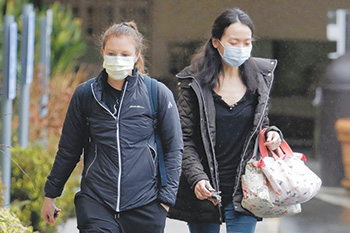Questions and answers about the coronavirus COVID-19
 If you think you may have caught or been exposed to the coronavirus (COVID-19), you’ve probably got some questions. Although much is still unknown, we rounded up the best answers from some reputable sources.
If you think you may have caught or been exposed to the coronavirus (COVID-19), you’ve probably got some questions. Although much is still unknown, we rounded up the best answers from some reputable sources.
WHAT ARE THE SYMPTOMS?
It can be similar to other respiratory illnesses – coughs, mild fevers, sore throat and nasal congestion. But it can also affect the whole body, not like a head cold or seasonal allergies. Symptoms can also include body aches, higher fevers and shortness of breath.
WHAT IS THE TREATMENT?
It’s a virus, so antibiotics won’t kill it, and antiviral drugs like those used against the flu won’t work because, while the coronavirus may feel similar to influenza, it is not the flu. A flu shot won’t prevent you from getting the coronavirus. Work on a vaccine is just beginning. Treatment of the symptoms (fever, cough, etc.) is pretty standard, but your body’s ability to fight it really comes down to your immune system. That is why people already in poor health are at higher risk and have a harder time getting over it.
HOW DO I KNOW IT’S NOT THE FLU?
Symptoms of both the flu and coronavirus may include fever, fatigue, body aches and cough. One of the telltale signs of coronavirus is shortness of breath, in addition to fever and severe muscle or joint aches. If you’ve traveled recently or may have been exposed to the virus, those should be red flags. The best advice, if you feel sick, is to go to the doctor.
HOW DO I KNOW IT’S NOT ALLERGIES?
Coronavirus will generally make you feel more tired than allergies – and allergies don’t normally cause severe muscle or joint aches.
WHO IS MOST AT RISK?
Those most at risk include older people, people with asthma or other lung diseases, those with heart disease or diabetes, and pregnant women.
IS IT THE SAME AS THE FLU?
The symptoms are similar, as noted above. Influenza is also a virus and can be very serious, causing people to be hospitalized and in some cases die. So far this year, more people have been infected with the flu than with coronavirus. They are both serious and to be avoided.
DO PREVENTIVE MEASURES WORK?
Absolutely. Although they can’t prevent all cases, lowering your risk of exposure or unintentionally spreading the virus is essentially the same as with the flu:
- Frequent and thorough handwashing.
- Avoid touching your face.
- Cough or sneeze into your elbow or into tissues and dispose of them.
- “Social distancing” (avoiding large crowds).
- Stay home if you are sick.
- Avoid exposure to people who are sick and stay away from healthy people if you are sick.
WHAT ABOUT CHILDREN?
Children are just as susceptible to the coronavirus as everyone else, but they tend to have less severe complications.
SHOULD I WEAR A FACE MASK?
Wearing a face mask is not an iron-clad guarantee that you won’t get sick – viruses can also transmit through the eyes and tiny viral particles, known as aerosols, can penetrate masks. However, masks are effective at capturing droplets, which is a main transmission route of coronavirus.
If you are likely to be in close contact with someone infected, a mask cuts the chance of the disease being passed on. If you are showing symptoms of coronavirus, or have been diagnosed, wearing a mask can protect others.
WHO IS AT HIGHEST RISK?
Those over 60 are considered at high risk, especially if they have underlying conditions such as heart disease or diabetes. They should load up on their prescriptions in case they need to stay home. As with the rest of the population, those at highest risk should keep space between themselves and others, avoid people who are sick, avoid crowds, cruises and non-essential air travel, and stay home as much as possible.
CAN I GET TESTED?
Missouri now has some tests available. Gov. Mike Parson reported on March 12 that 73 tests had been administered, with two positive results. That same day, Illinois reported conducting 418 tests, with 32 positive results, 294 negative and 92 still pending.
WANT MORE INFORMATION?
Harvard University has put together an online Coronavirus Resource Center at health.harvard.edu/diseases-and-conditions/coronavirus-resource-center.


Leave a Reply